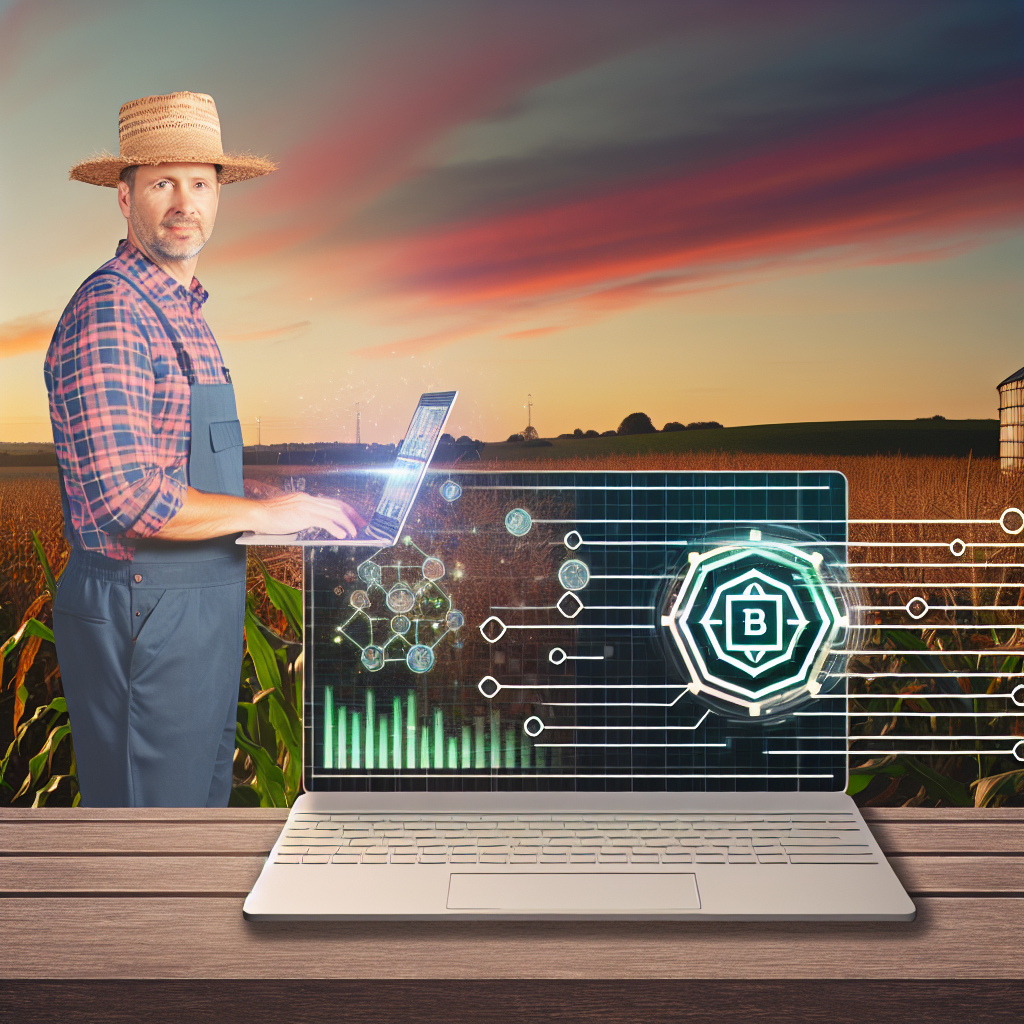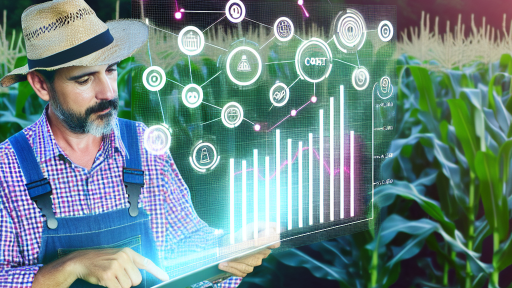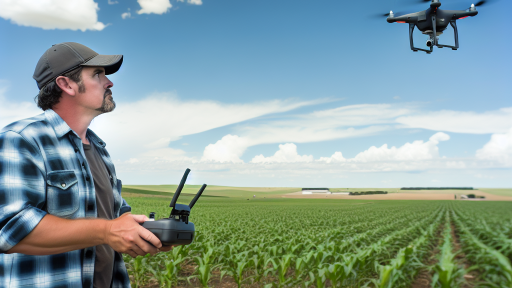Introduction to Blockchain Technology and Its Relevance to Agriculture
Blockchain technology is revolutionizing various industries, including agriculture.
This decentralized ledger system enhances transparency and trust among stakeholders.
Moreover, it records transactions securely and immutably, preventing data tampering.
Given the rapid technological advancements, agriculture must adopt innovative solutions.
Understanding Blockchain Basics
Blockchain consists of blocks that store data linked together in chronological order.
Each block contains a unique hash, timestamp, and transaction information.
Additionally, the consensus mechanism allows participants to validate transactions.
This structure promotes trust, ensuring all parties access the same information.
Benefits of Blockchain in Agriculture
Implementing blockchain in agriculture offers numerous advantages.
- First, it increases transparency throughout the supply chain.
- Next, it enhances traceability of agricultural products from farm to table.
- This technology also reduces fraud and improves food safety standards.
Furthermore, blockchain minimizes paperwork and administrative costs.
Real-World Applications
Several companies have begun integrating blockchain into agricultural operations.
For example, AgriDigital has improved grain supply chain management with blockchain.
Similarly, IBM’s Food Trust platform enhances food traceability for various producers.
These applications demonstrate blockchain’s potential to transform agriculture.
Challenges and Considerations
While the benefits are substantial, challenges remain in implementing blockchain.
Transform Your Agribusiness
Unlock your farm's potential with expert advice tailored to your needs. Get actionable steps that drive real results.
Get StartedFirstly, infrastructure costs can be a barrier for small-scale farmers.
Secondly, there is a need for industry-wide standards and interoperability.
Lastly, educating stakeholders about blockchain technology is crucial for success.
Current Challenges in Agricultural Record Keeping
Data Fragmentation
Agricultural data often resides in multiple systems.
This fragmentation complicates data management and analysis.
Farmers struggle to consolidate information from various sources.
Consequently, they may miss critical insights for decision-making.
Lack of Traceability
Traceability in agriculture is increasingly essential.
Yet, current methods often fail to provide clear records.
Consumers demand transparency regarding food origins.
However, current systems do not guarantee this transparency.
Error-Prone Processes
Manual record-keeping methods are often error-prone.
These errors can lead to significant losses for farmers.
Inaccurate records may result in compliance issues.
Regular errors can create distrust among stakeholders.
Costly Operations
Maintaining accurate records can be expensive.
Farmers may need to invest in specialized software and tools.
Moreover, labor costs for data entry can add up.
As a result, small-scale farmers may struggle to keep up.
Compliance Challenges
Agricultural regulations are constantly evolving.
Maintaining compliance requires up-to-date records.
If records are not well managed, farmers face penalties.
This uncertainty adds stress to agricultural operations.
Security Risks
Data security remains a significant concern in agriculture.
Showcase Your Farming Business
Publish your professional farming services profile on our blog for a one-time fee of $200 and reach a dedicated audience of farmers and agribusiness owners.
Publish Your ProfileUnauthorized access can compromise sensitive information.
Farmers must protect their records from potential breaches.
If compromised, confidential data could lead to financial losses.
Benefits of Integrating Blockchain in Agricultural Operations
Improved Transparency
Blockchain technology enhances transparency in agricultural operations.
This feature allows all stakeholders to track the origin of products.
Consumers can verify the quality and safety of their food.
Additionally, transparent records build consumer trust and loyalty.
Increased Efficiency
Blockchain streamlines supply chain processes in agriculture.
It reduces paperwork and the likelihood of human error.
Moreover, digital records are easier to share among stakeholders.
This efficiency can lead to quicker response times in the market.
Enhanced Security
Security is a significant benefit of using blockchain.
Data stored on the blockchain is immutable and tamper-proof.
This characteristic protects sensitive information from cyber threats.
Furthermore, it ensures compliance with regulatory requirements.
Cost Reduction
Integrating blockchain can lead to significant cost savings.
It reduces the need for intermediaries in transactions.
Consequently, farmers retain more profits from their sales.
Additionally, decreased fraud can lower overall operational costs.
Traceability of Products
Traceability is greatly enhanced through blockchain technology.
Farmers can monitor their products from farm to table.
This capability allows for quick identification of potential issues.
In case of recalls, actions can be taken swiftly to protect consumers.
Empowerment of Small Farmers
Blockchain empowers small farmers by providing direct access to markets.
This access reduces dependence on large distributors.
Smallholders can negotiate better deals and prices for their produce.
Consequently, this empowerment improves their livelihoods and resilience.
Explore Further: Integrated Pest Management Strategies with Modern Technology
How Blockchain Ensures Data Integrity and Transparency in Agriculture
Understanding Blockchain Basics
Blockchain technology acts as a decentralized ledger.
This ledger securely records transactions across various agricultural operations.
It enables all participants to access the same data in real time.
Consequently, data becomes less susceptible to tampering or loss.
Enhancing Data Integrity
Data integrity is critical for agricultural operations.
Blockchain enhances integrity through cryptographic techniques.
Each transaction is hashed before being added to the chain.
These hashes create a unique fingerprint for every entry.
Thus, any alteration to the data will be immediately detectable.
Increasing Transparency
Transparency serves as a fundamental principle in agriculture.
Blockchain provides full visibility of each transaction’s history.
This traceability helps maintain food safety standards.
Showcase Your Farming Business
Publish your professional farming services profile on our blog for a one-time fee of $200 and reach a dedicated audience of farmers and agribusiness owners.
Publish Your ProfileConsumers can verify the origin of their food products.
Furthermore, they can confirm the methods used to produce them.
Building Trust Among Stakeholders
Stakeholders benefit significantly from increased transparency.
Farmers, suppliers, and consumers gain confidence in the data presented.
Everyone can trust that the information is accurate and immutable.
This trust builds stronger relationships across the supply chain.
Regulatory Compliance and Reporting
Compliance with regulations is paramount for agricultural operations.
Blockchain simplifies the process of documenting adherence to standards.
Instant access to verified records facilitates timely reporting.
This efficiency reduces the administrative burden on farmers.
As a result, they can focus more on production and less on paperwork.
Potential Use Cases in Agriculture
Several use cases illustrate blockchain’s benefits in agriculture.
- Tracking the supply chain from farm to table.
- Verifying organic certifications for produce.
- Facilitating smart contracts between producers and buyers.
Looking Ahead
Future advancements will likely enhance blockchain’s capabilities.
New integrations with IoT devices could provide more real-time data.
This evolution will lead to more informed decision-making in agriculture.
Ultimately, embracing blockchain will empower the agricultural sector.
Gain More Insights: Enhancing Farm Efficiency Using AI
Case Studies of Successful Blockchain Implementations in Farming
Farm Traceability
FarmTrace implemented blockchain technology for enhanced traceability.
This system tracks products from farm to consumer.
Farmers input data at every stage of production.
Consumers can access detailed product histories quickly.
This transparency builds consumer trust.
Ultimately, it boosts sales for participating farmers.
Supply Chain Management
Agritech Solutions revolutionized supply chain management using blockchain.
Their platform connects farmers, distributors, and retailers seamlessly.
It automates documentation and reduces paperwork significantly.
As a result, overall operational efficiency improves dramatically.
Stakeholders can monitor supply chain stages in real-time.
This leads to faster response times to market changes.
Quality Assurance
GreenHarvest uses blockchain to ensure food quality and safety.
Their platform records every step from production to sale.
Detailed records help verify compliance with safety standards.
If food contamination occurs, tracing back is swift.
This minimizes risks to consumers and potential recalls.
Farmers benefit from reduced liability and enhanced reputation.
Incentivizing Sustainable Practices
EcoChain offers incentives for using environmentally friendly methods.
Farmers receive tokens for sustainable practices via blockchain tracking.
These tokens can be exchanged for discounts and services.
This motivates farmers to adopt greener methods effectively.
Consequently, eco-friendly farming gains traction within the industry.
Showcase Your Farming Business
Publish your professional farming services profile on our blog for a one-time fee of $200 and reach a dedicated audience of farmers and agribusiness owners.
Publish Your ProfileConsumers appreciate and favor brands emphasizing sustainability.
Insurance and Risk Management
CropSecure utilizes blockchain for automating insurance claims.
Farmers register their crops and conditions on the platform.
This data ensures transparency and reduces fraud.
In the event of crop failure, claims processing accelerates.
Farmers receive timely compensation for their losses.
This security provides peace of mind, promoting investment in agriculture.
See Related Content: How Automated Machinery Reduces Labor In Agriculture
The Role of Smart Contracts in Automating Agricultural Transactions
Introduction to Smart Contracts
Smart contracts represent a significant evolution in agricultural transactions.
They automate processes and enhance trust between parties.
By executing predetermined agreements, they reduce the need for intermediaries.
Benefits of Using Smart Contracts
Using smart contracts simplifies payment processing.
Farmers receive payments instantly upon fulfilling contract terms.
This feature ensures prompt rewards for delivered goods.
Additionally, it enhances transparency in transactions.
Both parties can verify transaction details at all times.
Enhanced Traceability of Agricultural Products
Smart contracts improve traceability of agricultural products.
They record each step of the supply chain on the blockchain.
This access helps consumers verify product origins.
Consequently, it builds trust in the marketplace.
Reducing Disputes in Agricultural Transactions
Disputes can stall agricultural deals and harm relationships.
Smart contracts help reduce misunderstandings between parties.
They provide clear, enforced terms of agreement for all involved.
As a result, conflicts decrease significantly.
Implementation Considerations
While adopting smart contracts, several factors must be evaluated.
First, the technology must be compatible with existing systems.
Second, stakeholders need adequate training on blockchain use.
Finally, regulatory compliance is crucial to ensure smooth operations.
Uncover the Details: Transforming Farm Operations Through Blockchain-Based Supply Chains

Future Trends: The Evolution of Blockchain in Agriculture
Improved Traceability
Blockchain technology enhances traceability in agricultural supply chains.
Every transaction gets recorded on an immutable ledger.
Farmers and consumers can track product origins easily.
This transparency boosts consumer trust significantly.
Increased Efficiency
Implementing blockchain reduces paperwork and manual errors.
Smart contracts automate processes throughout the supply chain.
This automation allows for quicker transaction settlements.
Resource management becomes more efficient as well.
Enhanced Data Security
Blockchain technology provides robust security measures for data.
Data integration occurs securely across platforms with delicacy.
Farmers can safeguard sensitive information against unauthorized access.
Showcase Your Farming Business
Publish your professional farming services profile on our blog for a one-time fee of $200 and reach a dedicated audience of farmers and agribusiness owners.
Publish Your ProfileThis improved security fosters confidence among stakeholders.
Decentralized Marketplace Models
The evolution of blockchain paves the way for decentralized marketplaces.
These platforms connect farmers directly with consumers.
This reduces reliance on intermediaries and increases profits for farmers.
Furthermore, consumers benefit from fresher products and better pricing.
Collaboration Across Sectors
Blockchain promotes collaboration among various agricultural sectors.
Sharing of data leads to better decision-making and strategies.
As a result, this collaboration drives innovation in agriculture.
Farmers, distributors, and retailers will work together more effectively.
Global Standardization
Blockchain can lead to the establishment of global standards in agriculture.
Standardization will ensure compliance with quality and safety regulations.
It simplifies international trade and access to new markets.
Consequently, it enhances global food security.
Challenges and Limitations of Using Blockchain in Agricultural Record Keeping
Technological Barriers
Implementing blockchain technology requires significant upfront investment.
Smaller farms often lack the financial resources for such investments.
Additionally, farmers may struggle with the technical skills needed to operate these systems.
Scalability Issues
Scaling blockchain solutions to support large agricultural operations can be complex.
Increased transactions can lead to network congestion and inefficiency.
As a result, the platform may not always meet real-time data needs.
Regulatory Challenges
The regulatory landscape for blockchain in agriculture is still evolving.
Farmers must navigate various laws that govern record keeping.
Compliance with these laws can be burdensome and time-consuming.
Data Privacy Concerns
Using blockchain involves sharing data across multiple parties.
This raises questions about data privacy and ownership.
Farmers may fear exposure of sensitive information to competitors.
Interoperability Issues
Different blockchain platforms may not work seamlessly together.
This lack of interoperability can create friction in data sharing.
Consequently, farmers may prefer traditional methods over blockchain solutions.
Best Practices for Farmers Implementing Blockchain Solutions
Understanding Blockchain Technology
Farmers should start by researching blockchain technology thoroughly.
Understanding its principles will facilitate effective implementation.
Furthermore, grasping blockchain’s benefits can enhance productivity.
Identify Relevant Use Cases
Determine suitable blockchain applications for agricultural operations.
For instance, track supply chains or monitor crop health.
Evaluate how these applications can fulfill specific needs.
Select the Right Technology Partners
Choose technology partners with experience in agricultural blockchain.
Review their past projects to assess their capabilities.
Additionally, consider companies that prioritize data security.
Invest in Training and Education
Provide training programs for staff to understand blockchain tools.
Invest in workshops to elevate knowledge across the team.
Training creates a skilled workforce that can leverage technology effectively.
Showcase Your Farming Business
Publish your professional farming services profile on our blog for a one-time fee of $200 and reach a dedicated audience of farmers and agribusiness owners.
Publish Your ProfileEstablish Data Standards
Develop consistent data entry standards for blockchain records.
Standardization ensures data accuracy and integrity.
Moreover, it simplifies the integration of various data sources.
Ensure Regulatory Compliance
Stay updated on regulations surrounding blockchain in agriculture.
Complying with legal requirements builds trust among stakeholders.
Additionally, follow best practices to safeguard agricultural data.
Monitor and Optimize Blockchain Systems
Regularly assess the performance of blockchain solutions.
Gather feedback from users to identify potential improvements.
Optimize systems based on real-world experiences to enhance efficiency.
Additional Resources
A Survey of Blockchain Applications for Management in Agriculture …
Blockchain technology for agricultural supply chains during the …




